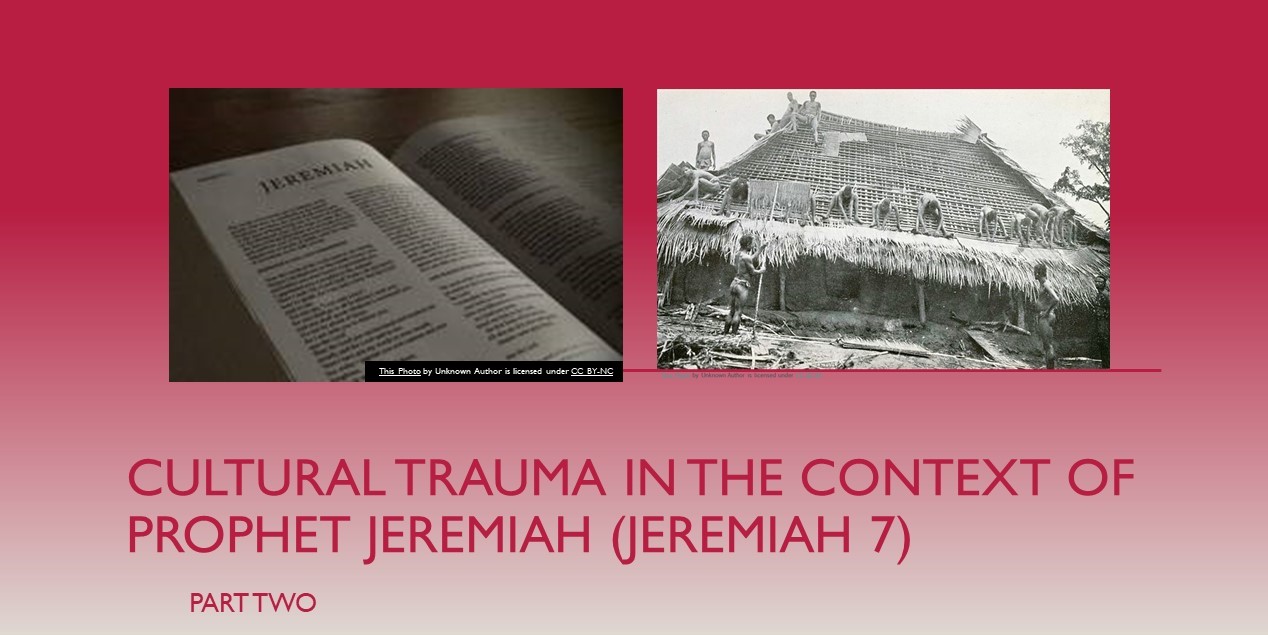 The Preacher Jeremiah is reminding the people once more of the central tenets of their faith as represented in the bible, Covenant and Sabbath, so re-symbolising reality for the people who find themselves in a situation of absolute desymbolisation. In the first of Jeremiah’s sermons in Jeremiah 7, typically called the ‘Temple Sermon,’ the prophet, standing outside of the temple (church), tells the people that God’s presence in them is conditional. The people in an almost magical or ritualistic fashion believed that God’s presence in the temple (church) would make them untouchable (Psalm 46). This belief is evident in their repetition of the words: “This is the temple (church) of the Lord, the temple (church) of the Lord” (Jer. 7:4). Jeremiah, however, warned that in spite of what they believed, the temple (church) would no longer serve as their safe haven that would keep them safe from all harm, if they continued to commit gross prejudices.
The Preacher Jeremiah is reminding the people once more of the central tenets of their faith as represented in the bible, Covenant and Sabbath, so re-symbolising reality for the people who find themselves in a situation of absolute desymbolisation. In the first of Jeremiah’s sermons in Jeremiah 7, typically called the ‘Temple Sermon,’ the prophet, standing outside of the temple (church), tells the people that God’s presence in them is conditional. The people in an almost magical or ritualistic fashion believed that God’s presence in the temple (church) would make them untouchable (Psalm 46). This belief is evident in their repetition of the words: “This is the temple (church) of the Lord, the temple (church) of the Lord” (Jer. 7:4). Jeremiah, however, warned that in spite of what they believed, the temple (church) would no longer serve as their safe haven that would keep them safe from all harm, if they continued to commit gross prejudices.
In Jer. 7:3, God warns the people to change their ways and to do what is right. If they do this, God will allow them to keep on living and be their refuge. In the reality church is refers to the temple that is the place where God causes God’s name to dwell (Deut. 12:5, 11; 14:23). The heart of the Jeremiah Sermon consists of a list of the injustices that the people are supposed to have committed. In Jer. 7:5-7, they are called to stop oppressing the poor, the orphans and the widows – a command that goes back to the special provision that is made for the protection and provision of these most vulnerable persons example; Deut. 14:29; 16:11, 14:24:17,19, 20-21. In particular, the reference in Jer. 7:6 of not “shedding innocent blood in the church” echoes the commandments in Deut. 19:10, 13; 21:8, 9.23 And in Jer.7:9.
In haunting fashion, God warns in Jer. 7:11: “You know, I too am watching.” This theme of a God who sees injustice and who hears the cries of those in pain: the marginalised, the poor and the oppressed, echoes the portrayal of a God who hears and sees the suffering of the people at the hand of their leaders pastors men and women of God, causing God to remember the covenant with Abraham, Isaac and Jacob (Exod. 2:23-24). It is also the same God who in a special way is the God of the widow, orphan, oppressed and poor, who is said to “executes justice for the orphan and the widow” in Deut. 10:18; “
However, is clear that the people had not followed God’s commandments as found in the bible. Citing the example of the sanctuary in Shilo, God declares in Jer. 7:12 that God’s anger and wrath will be poured out on the churches in the Land associated with the enemy’s earth policy, everything and everyone will be burned with an unquenchable fire (Jer. 7:20). It is significant though that, Jeremiah does not directly say that the temple (church) will be destroyed. Instead, the prophet refers to the destruction of another sanctuary north of Jerusalem that, serves as a sermonic tactic that speaks about the disaster in symbol and code. The Temple (church) Sermon ends with a chilling description of corpses, scattered in the Land waiting to be eaten by the birds and wild animals (Jer. 7:33) – a reality captured in the final words of Jeremiah’s sermon: “For the land shall become a waste” (Jer. 7:34).
This picture reflects the complete destructions that follows in the wake of the covid-19 and seems to constitute a haunting presentation of the curses found in Deut. 27:15-26. As Deut. 27:26 concludes: “Cursed be anyone who does not uphold the words of this law by observing them.” understanding, that the prophet proclaims that the people did not listen and did not respond when God called them (Jer. 7:13; ) also, the repeated use of the verbs ‘not listening’ and ‘not obeying’ in Jer. (7:24, 26, 27, 28) therefore, God rejects them, as the following chilling words of judgment maintain Saying:
“Your prayers are pointless. God will not hear you” (Jer.7:16) (Jeremiah’s Sermons through the Lens of Cultural Trauma).
Tyty 2021





Great delivery. Outstanding arguments. Keep up the great work.
Magnificent items from you, man. I’ve consider your stuff previous to and you are simply too magnificent.
I really like what you have obtained here, certainly like what you’re stating and
the way through which you are saying it. You’re making it entertaining and you
continue to take care of to stay it smart. I cant wait to learn much more from you.
That is actually a wonderful website.
Thank you!
I was curious if you ever considered changing the layout of your site?
Its very well written; I love what youve got to say.
But maybe you could a little more in the way of content so people
could connect with it better. Youve got an awful lot
of text for only having 1 or 2 pictures. Maybe
you could space it out better?
Thank you!
If you desire to grow your know-how only keep visiting this site and be updated
with the hottest gossip posted here.
Great content! Keep up the good work!